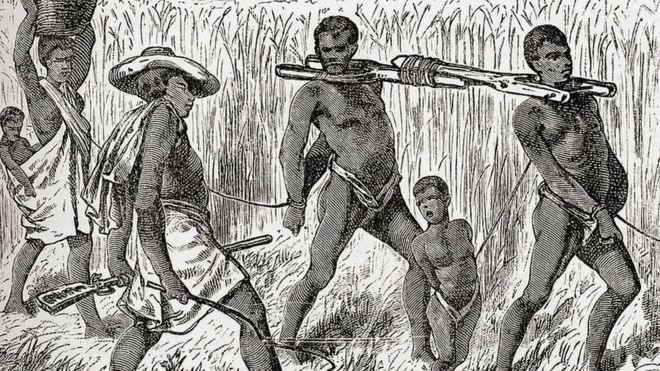My great-grandfather, Nwaubani Ogogo Oriaku, was what I prefer to call a businessman, from the Igbo ethnic group of south-eastern Nigeria. He dealt in a number of goods, including tobacco and palm produce. He also sold human beings. "He had agents who captured slaves from different places and brought them to him," my father told me.
Nwaubani Ogogo's slaves were sold through the ports of Calabar and Bonny in the south of what is today known as Nigeria. People from ethnic groups along the coast, such as the Efik and Ijaw, usually acted as stevedores for the white merchants and as middlemen for Igbo traders like my great-grandfather. They loaded and offloaded ships and supplied the foreigners with food and other provisions. They negotiated prices for slaves from the hinterlands, then collected royalties from both the sellers and buyers. (Read more.)
Meanwhile, slavery is alive and well in America, although things have gotten better since Trump became President. From The Rutherford Institute:
Children, young girls—some as young as 9 years old—are being bought and sold for sex in America. The average age for a young woman being sold for sex is now 13 years old. This is America’s dirty little secret. Sex trafficking—especially when it comes to the buying and selling of young girls—has become big business in America, the fastest growing business in organized crime and the second most-lucrative commodity traded illegally after drugs and guns.
As investigative journalist Amy Fine Collins notes, “It’s become more lucrative and much safer to sell malleable teens than drugs or guns. A pound of heroin or an AK-47 can be retailed once, but a young girl can be sold 10 to 15 times a day—and a ‘righteous’ pimp confiscates 100 percent of her earnings.” Consider this: every two minutes, a child is exploited in the sex industry. According to USA Today, adults purchase children for sex at least 2.5 million times a year in the United States.
Who buys a child for sex? Otherwise ordinary men from all walks of life. “They could be your co-worker, doctor, pastor or spouse,” writes journalist Tim Swarens, who spent more than a year investigating the sex trade in America. In Georgia alone, it is estimated that 7,200 men (half of them in their 30s) seek to purchase sex with adolescent girls each month, averaging roughly 300 a day. On average, a child might be raped by 6,000 men during a five-year period of servitude.
It is estimated that at least 100,000 children—girls and boys—are bought and sold for sex in the U.S. every year, with as many as 300,000 children in danger of being trafficked each year. Some of these children are forcefully abducted, others are runaways, and still others are sold into the system by relatives and acquaintances.
“Human trafficking—the commercial sexual exploitation of American children and women, via the Internet, strip clubs, escort services, or street prostitution—is on its way to becoming one of the worst crimes in the U.S.,” said prosecutor Krishna Patel. (Read more.)
In fact, Jeffrey Epstein remained a highly sought-after companion among the elite, even after his release from jail on sex offender charges. A dinner at his New York mansion was attended by such media luminaries as Katie Couric, Chelsea Handler, and George Stephanopolous, whose wife just publicly urged parents to watch porn with their children.
And it wasn’t just media stars who loved Epstein. Bill Gates, who has endowed the world’s largest charitable organization, visited Epstein many times and maintained close ties through his staff. Harvard University gave Epstein his own office, phone line, and unlimited access, after he donated $9 million for scientific research. And Harvard faculty visited Epstein in his various homes and in jail and flew on his private planes.
As the magnitude of the Epstein-Maxwell saga reaches the public, it’s becoming harder for elites to haughtily wave away attention to their behavior. In previous times, the story about Wayfair that raced across social media last week might never even have surfaced. But in today’s environment, this odd development inspired countless TikTok videos, outraged tweets and media denials. (Read more.)


















No comments:
Post a Comment